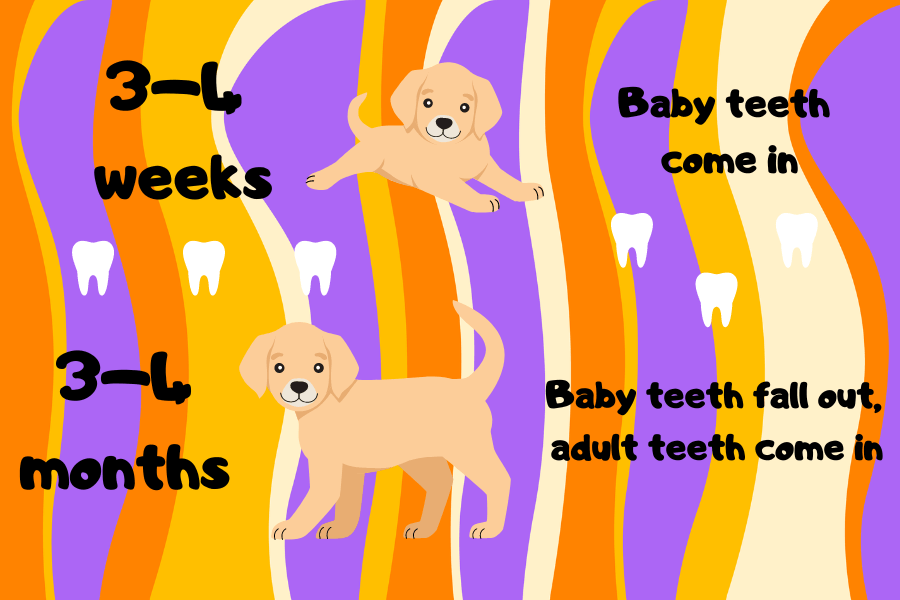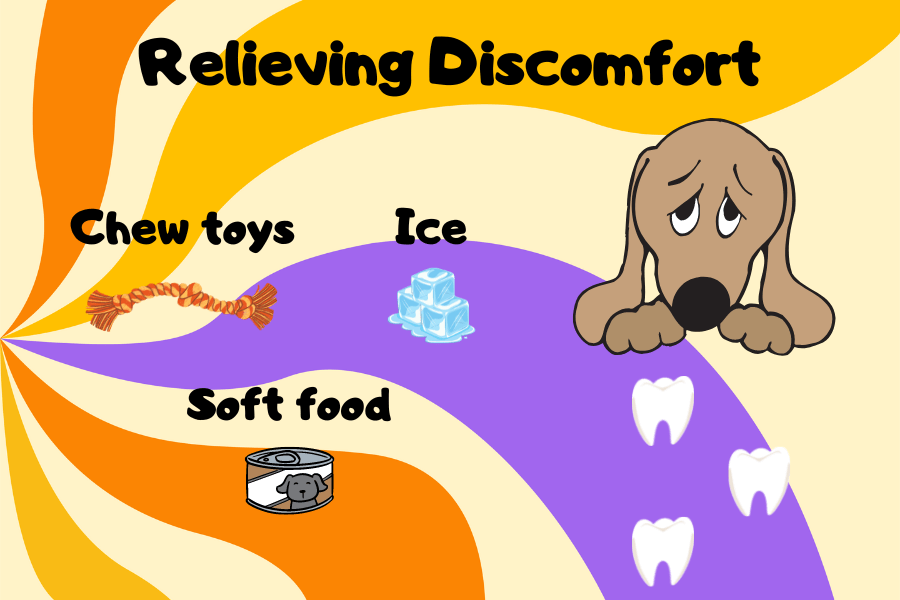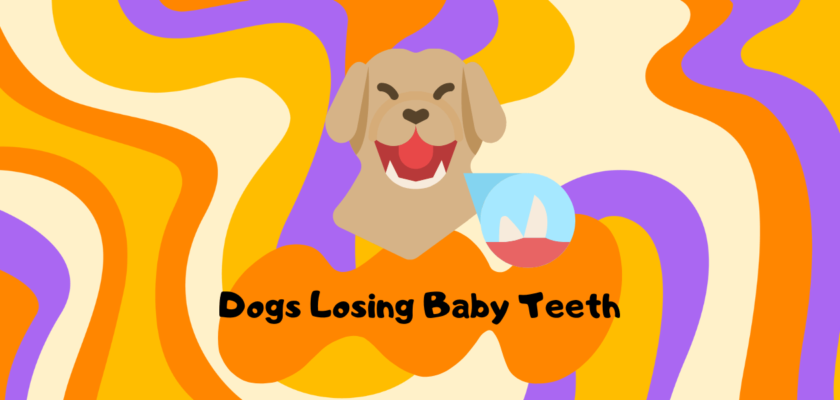Key Takeaways
- Dogs grow from having no teeth to 28 baby teeth by the time they’re 6 weeks old 🐶
- Puppies start losing their baby teeth when they’re 3–4 months old, and they should have a full set of adult ones by 6–7 months of age 🐶
- To make it easier, provide chew toys, cold washcloths or ice cubes, and soft food that’s easy to chew 🐶
When Do Puppies Grow Teeth?
Dogs have two sets of teeth in their lifetime: baby teeth and adult teeth. Just like human babies, puppies are born without any teeth. Around 3 or 4 weeks of age, they start to develop their first set of baby teeth, which are typically called “deciduous” or “milk” teeth.

The transition from drinking milk to eating solid food is called weaning. During this time, you may notice that your pup’s gums are starting to swell, and they may be drooling more than usual. By 6 weeks old, most puppies have a full set of 28 teeth. When do dogs lose baby teeth, though? Keep reading.
What Is the Purpose of Puppy Teeth?
Baby teeth are important for a few reasons. Firstly, they help your puppy learn how to chew properly. Baby teeth also help keep the adult teeth in place until they come in fully. Lastly, baby teeth play an important role in socialization. Puppies use their baby teeth to interact with other dogs and puppies, which helps them develop strong social skills.
Did You Know… 🔍
Puppy teeth are sharper than permanent ones. This helps puppies hunt without the skills they’ll gain later, and it also makes chewing easier for them. Their jaws aren’t as strong as adult dogs’ jaws, so having sharper teeth helps them break down their food more easily. If your new puppy is using their canine teeth to nip and play, it’s important to teach them to be gentle.
When Do Puppies Lose Their Baby Teeth?
The reason puppies have to lose their 28 baby teeth is because they simply outgrow them. As your puppy’s jaw grows, their milk teeth become loose and eventually fall out. When do dogs lose baby teeth? The process of losing their baby teeth usually starts around 3 or 4 months of age. However, this can vary depending on the dog’s breed and individual growth rate.
For example, small breeds tend to lose their baby teeth sooner than large breeds. Some puppies may lose all of their teeth by 6 months old, while others may have a few left until they’re a year old. The 42 adult teeth come in as the deciduous ones fall out. However, this can vary depending on the breed and individual growth rate of your dog as well. By 6–7 months, they should have them all.
Differences Between Deciduous Teeth and Permanent Teeth
Permanent teeth are typically larger and stronger than baby teeth. They’re also designed to last a lifetime, whereas baby teeth are only meant to be temporary. You may notice that permanent ones are less sharp than baby teeth. As your dog gets older, their teeth may also start to wear down and become discolored.
What to Do During Puppy Teething and Tooth Replacement?
Your puppy’s initial teething, and then growing adult teeth, can be a confusing time. But with a little patience and preparation, it can be a smooth experience for both you and your pup! There are a few things you can do to make the process easier.
- Provide plenty of chew toys for your dog to gnaw on. This will help them relieve some of the pain and discomfort associated with teething.
- Give them cold washcloths or ice cubes to chew on.
- If your puppy is in a lot of pain, you can talk to your vet about getting them some pain medication.
- Be sure to give your pup plenty of fluids and food. Puppies tend to lose their appetite when they’re teething, so it’s important to make sure they’re getting enough nutrients.
- Offer them soft, easy-to-chew food.
- Keep a close eye on your dog during this time. Teething can cause discomfort and irritability, so if you notice that your pup is acting out, be sure to consult your veterinarian.

How to Feed a Teething Puppy?
If you want to make your own teething food for your puppy, there are easy recipes you can follow. For example, you can mix some chicken broth or water with some plain yogurt, add a little bit of rice cereal to thicken it up, and freeze it in an ice cube tray. You can also give them frozen fruits or vegetables – carrots and bananas are good options. Just make sure they can’t choke on anything you give them.
What Happens If a Puppy Swallows a Tooth?
If your puppy swallows a tooth, there’s no need to worry. Puppies typically digest their teeth without any problems. However, if your puppy is having any other symptoms – such as vomiting or diarrhea – it’s important to seek veterinary care promptly. This could be a sign of an underlying health issue and should be addressed by a professional.
Summary: Do Dogs Lose Baby Teeth?
In conclusion, do dogs lose baby teeth? Yes! The process itself might vary from dog to dog depending on their breed, size and individual factors, but it does eventually happen. On average, it starts when the puppy is 3–4 months old. You can alleviate the symptoms by providing plenty of chew toys and bones for your pup to gnaw on, fresh water and healthy food, and regular vet checkups. Finally, be patient! Teething can be a bit messy and uncomfortable for both dog and owner alike. But with a little TLC, it will eventually pass.
Frequently Asked Questions

What Does a Puppy Tooth Look Like When It Falls Out?
Some people compare their puppies’ baby teeth to rice grains appearing all over the house. They’re very small and sharp, usually white or cream in color. They can be hard to spot because they may not fall out whole, and your pooch may swallow most of them!
Which Teeth Do Puppies Lose?
Puppies eventually lose all their baby teeth – incisors, canines, and premolars. Once they’re adult dogs, they’ll have more teeth than they had at first, and they’ll all be larger and better suited to their diet.
Do Puppies Lose Teeth At 5 Months?
It’s perfectly normal for a puppy’s teeth to fall out at 5 months old. This is when most of their adult teeth typically come in, and the baby ones loosen and fall out. It’s an important milestone for puppies – all of their permanent teeth should be in by 6 or 7 months.
Can a 1 Year Old Dog Be Teething?
Sometimes, dogs retain a few deciduous teeth past the normal age, and they may lose them at 1 year old. This is rare, but it can happen, so if your puppy is still missing some new teeth or has some retained baby ones that haven’t fallen out, have your veterinarian take a look.
At What Age Do Puppies Lose Their Fang Teeth?
Your pup may lose their fangs (canines) anywhere between 3 and 6 months of age. They’re often among the first teeth to fall out, so expect your pup to lose them when they’re 3–4 months old.
Similar Posts:
- Do Cats Lose Baby Teeth? Here’s Everything You Should Know About Kitten Teething
- Can Dogs Eat Ice? Why Do Vets Recommend Ice Cubes for Dogs?
- Can Dogs Eat Carrots? Healthy Snacks for Puppies
- Can Dogs Eat Baby Food? The Rules of Feeding Your Dog
- Do Dogs Burp? What Does It Mean if Your Dog Burps a Lot?
- Why Does My Dog Suck On Blankets? All You Should Know About Suckling Habits
- Puppies Going Outside: How Long After 2nd Puppy Vaccination Can They Go Out?
- How to Introduce Dogs to Each Other? A New Dog in Your House

